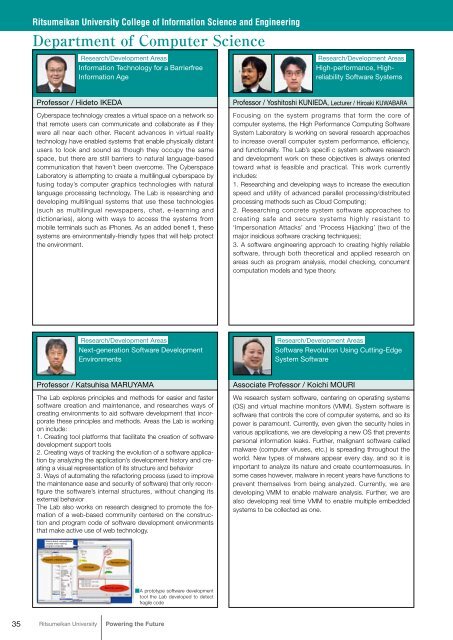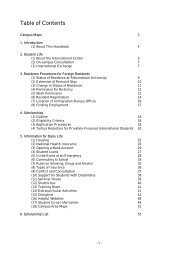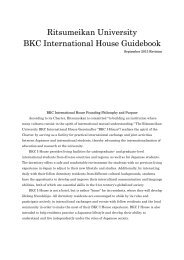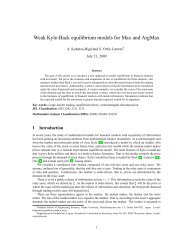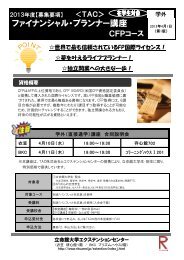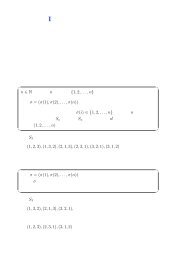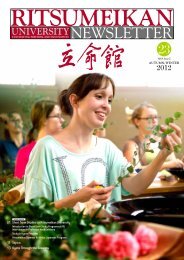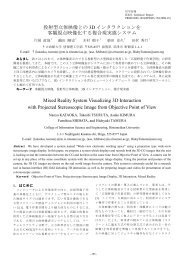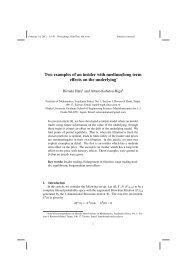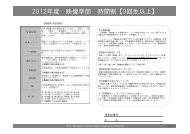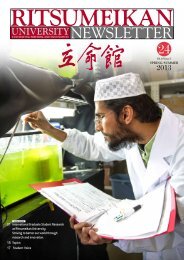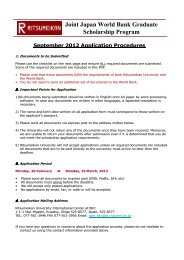Powering the Future - 立命館大学
Powering the Future - 立命館大学
Powering the Future - 立命館大学
You also want an ePaper? Increase the reach of your titles
YUMPU automatically turns print PDFs into web optimized ePapers that Google loves.
Ritsumeikan University College of Information Science and Engineering<br />
Department of Computer Science<br />
Research/Development Areas<br />
Information Technology for a Barrierfree<br />
Information Age<br />
Research/Development Areas<br />
High-performance, Highreliability<br />
Software Systems<br />
Professor / Hideto IKEDA<br />
Cyberspace technology creates a virtual space on a network so<br />
that remote users can communicate and collaborate as if <strong>the</strong>y<br />
were all near each o<strong>the</strong>r. Recent advances in virtual reality<br />
technology have enabled systems that enable physically distant<br />
users to look and sound as though <strong>the</strong>y occupy <strong>the</strong> same<br />
space, but <strong>the</strong>re are still barriers to natural language-based<br />
communication that haven’t been overcome. The Cyberspace<br />
Laboratory is attempting to create a multilingual cyberspace by<br />
fusing today’s computer graphics technologies with natural<br />
language processing technology. The Lab is researching and<br />
developing multilingual systems that use <strong>the</strong>se technologies<br />
(such as multilingual newspapers, chat, e-learning and<br />
dictionaries), along with ways to access <strong>the</strong> systems from<br />
mobile terminals such as iPhones. As an added benefi t, <strong>the</strong>se<br />
systems are environmentally-friendly types that will help protect<br />
<strong>the</strong> environment.<br />
Professor / Yoshitoshi KUNIEDA, Lecturer / Hiroaki KUWABARA<br />
Focusing on <strong>the</strong> system programs that form <strong>the</strong> core of<br />
computer systems, <strong>the</strong> High Performance Computing Software<br />
System Laboratory is working on several research approaches<br />
to increase overall computer system performance, efficiency,<br />
and functionality. The Lab’s specifi c system software research<br />
and development work on <strong>the</strong>se objectives is always oriented<br />
toward what is feasible and practical. This work currently<br />
includes:<br />
1. Researching and developing ways to increase <strong>the</strong> execution<br />
speed and utility of advanced parallel processing/distributed<br />
processing methods such as Cloud Computing;<br />
2. Researching concrete system software approaches to<br />
creating safe and secure systems highly resistant to<br />
‘Impersonation Attacks’ and ‘Process Hijacking’ (two of <strong>the</strong><br />
major insidious software cracking techniques);<br />
3. A software engineering approach to creating highly reliable<br />
software, through both <strong>the</strong>oretical and applied research on<br />
areas such as program analysis, model checking, concurrent<br />
computation models and type <strong>the</strong>ory.<br />
Research/Development Areas<br />
Next-generation Software Development<br />
Environments<br />
Research/Development Areas<br />
Software Revolution Using Cutting-Edge<br />
System Software<br />
Professor / Katsuhisa MARUYAMA<br />
The Lab explores principles and methods for easier and faster<br />
software creation and maintenance, and researches ways of<br />
creating environments to aid software development that incorporate<br />
<strong>the</strong>se principles and methods. Areas <strong>the</strong> Lab is working<br />
on include:<br />
1. Creating tool platforms that facilitate <strong>the</strong> creation of software<br />
development support tools<br />
2. Creating ways of tracking <strong>the</strong> evolution of a software application<br />
by analyzing <strong>the</strong> application’s development history and creating<br />
a visual representation of its structure and behavior<br />
3. Ways of automating <strong>the</strong> refactoring process (used to improve<br />
<strong>the</strong> maintenance ease and security of software) that only reconfigure<br />
<strong>the</strong> software’s internal structures, without changing its<br />
external behavior<br />
The Lab also works on research designed to promote <strong>the</strong> formation<br />
of a web-based community centered on <strong>the</strong> construction<br />
and program code of software development environments<br />
that make active use of web technology.<br />
Associate Professor / Koichi MOURI<br />
We research system software, centering on operating systems<br />
(OS) and virtual machine monitors (VMM). System software is<br />
software that controls <strong>the</strong> core of computer systems, and so its<br />
power is paramount. Currently, even given <strong>the</strong> security holes in<br />
various applications, we are developing a new OS that prevents<br />
personal information leaks. Fur<strong>the</strong>r, malignant software called<br />
malware (computer viruses, etc.) is spreading throughout <strong>the</strong><br />
world. New types of malware appear every day, and so it is<br />
important to analyze its nature and create countermeasures. In<br />
some cases however, malware in recent years have functions to<br />
prevent <strong>the</strong>mselves from being analyzed. Currently, we are<br />
developing VMM to enable malware analysis. Fur<strong>the</strong>r, we are<br />
also developing real time VMM to enable multiple embedded<br />
systems to be collected as one.<br />
Warns about vulnerabilities<br />
created when making<br />
program revisions<br />
Program creation screen<br />
Revised code<br />
Old code<br />
Security warning<br />
■A prototype software development<br />
tool <strong>the</strong> Lab developed to detect<br />
fragile code<br />
35 Ritsumeikan University <strong>Powering</strong> <strong>the</strong> <strong>Future</strong>


